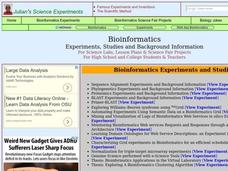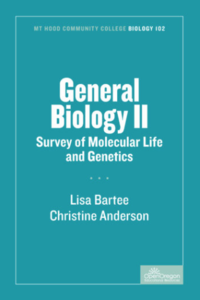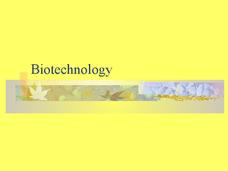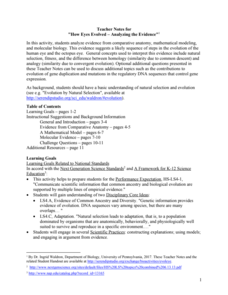Curated OER
Characterization of the Bioluminescence (Lux+) Gene E. coli
Students grow E. coli strain HB101, which contains the plasmid pUCD607 with the bioluminescence (Lux+) gene. The plasmid containing the Lux+ gene is isolated from the E. coli, then characterized by restriction analysis.
Serendip
The Molecular Biology of Mutations and Muscular Dystrophy
Different types of mutations cause unique types and degrees of muscular dystrophy. Scholars learn about the types of mutations and the impact on the body. They compare the location of the mutations and draw conclusions about how it is...
Curated OER
Bioinformatics
Learners conduct a series of scientific investigation using bioinformatics. In this molecular biology lesson plan, students collect experimental data using different educational softwares. They calculate and analyze relationships using...
Open Oregon Educational Resources
General Biology II: Survey of Molecular Life and Genetics (Mt. Hood Community College Biology 102)
What could be more real life than a biology course? Mt. Hood Community College offers a complete biology textbook with an emphasis on genetics. Topics range from DNA replication to biotechnology and inheritance patterns.
Howard Hughes Medical Institute
The Molecular Evolution of Gene Birth and Death
An upper-level biology activity, the comprehensive worksheet found here accompanies a PowerPoint and the video The Making of the Fittest: The Birth and Death of Genes, both of which are linked to through the website. Depending on the...
Curated OER
Control of Eukaryotic Genes
Covering the molecular interactions involved with DNA packing and the control of gene activity in depth, this slideshow is useful for higher-level biology students. The biochemical components of protein translation are diagrammed and...
Serendip
Using Molecular and Evolutionary Biology to Understand HIV/AIDS and Treatment
HIV mutates rapidly, making treatments challenging to find. Scholars learn about why it mutates so quickly and how scientists race to find treatments. The resource approaches the issue from both a molecular and evolutionary perspective...
Curated OER
The Effect of Natural Selection on Genes, Traits and Individuals
Rotating through five stations, evolutionary biologists explore the question of how changes in DNA facilitate the changes in a population over time. High-quality, colorful cards of animals, skeletons, skulls, and DNA sequences can all be...
Curated OER
From Gene to Protein
Here is a detailed presentation to assist in your lectures on the difficult topic of genetic transcription. The history, discovery, and scientific breakthroughs will spark interest. The last 15 slides deal with the biochemistry and...
Curated OER
Control of Prokaryotic (Bacterial) Genes
A nicely formatted set of slides that logically follow and define the structure and function of the genes in Bacteria. The repressor proteins and other gene regulators are listed and diagrams support the explanations of their function on...
Curated OER
Biotechnology
A continuous cascade of information comes through this PowerPoint on biotechnology. The topic is defined, a history is presented, and basic genetic engineering techniques are explained. The topic is covered in an objective manner,...
Curated OER
Gene Cloning Worksheet #1
For this gene cloning worksheet, students are given a gene sequence of DNA, plasmid DNA, 3 restriction enzymes, their cut patterns and a DNA ligase. They answer 6 questions about the results of using different restriction enzymes to cut...
Serendip
From Gene to Protein via Transcription and Translation
DNA carries the codes for creating just the right protein. A well-designed lesson leads pupils through the process from start to finish and everywhere in between. Guiding questions with supporting video help scholars understand the...
Serendip
How Eyes Evolved – Analyzing the Evidence
Octopodes existed for hundreds of thousands of years before humans, yet our eyes share many similarities. Scholars analyze the evidence to determine if the evolution of eyes best fits a homology or analogy model. They discuss the issue...
Curated OER
Genetics and Molecular Biology
Students create DNA models using colored construction papers. For this biology lesson, students identify enzyme restriction sites. They model how DNA plasmids replicate when taken up by a bacterial cell.
Howard Hughes Medical Institute
Central Dogma and Genetic Medicine
Scientists work every day to find solutions to genetic diseases. Scholars learn about the process of gene sequencing, mutations, and the results. They explore genetic diseases and therapies to intervene and help and, through case...
Curated OER
The Case of Regulation in Cells
After your biologists have learned about transcription, translation, and gene regulation, they work in a small group to create a poster of a system that serves as an analogy of the gene regulation process. They share their creations with...
Curated OER
DNA and Genes
Students analyze the structure of DNA. They describe how the structure of DNA enables it to reproduce itself accurately. Students discuss genes and the sequence of nucleotides occur in DNA.
Curated OER
How Genes Work Lesson Plan
Students define the key terms that are the structure and function of DNA. In this genetics lesson plan students complete a lab activity in which they construct a model DNA structure.
Curated OER
Molecular Approaches to Evolution
Students examine the molecular studies of organisms that have led to a new era in their understanding of speciation and evolutionary relationships. Students study the allelic frequency of genes controlling specific molecules and assess...
Serendip
From Gene to Protein - Transcription and Translation
Learners identify the different steps involved in DNA transcription. In this genetics lesson, pupils complete a worksheet and model the translation process with a paper chain activity. They watch a video on sickle cell anemia and explain...
Curated OER
Molecular Approaches to Evolution
Students are introduced to working with molecular data. The first activity does both simulated and original data are used to compare amino acid, protein or DNA differences to construct phylogenetic trees or cladograms. These activities...
Curated OER
Trichinella Forensics
Students engage in DNA manipulation using forensics techniques. Students investigate topics involved in forensics studies such as cloning, electrophoresis, gene mapping, replication, and transcription.
Curated OER
Genetics
An interesting PowerPoint which provides the main facts, definitions, and terminology necessary for understanding DNA. It also presents summaries of the processes involved with DNA replication and the application of protein isolation and...

























